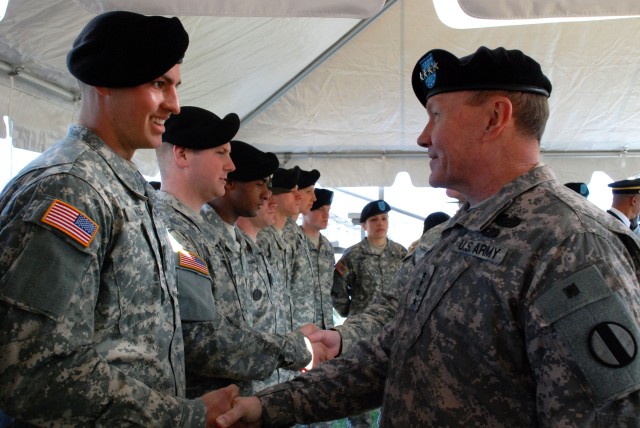
Gen. Martin E. Dempsey, commanding general of the U.S. Army Training and Doctrine Command, said Tuesday the Army is training for and fighting the wars in Iraq and Afghanistan in a vastly different way than it did during the initial days of the conflicts.
"Someone's going to do a doctoral thesis on that some day and I'm sure they'll have some complimentary things to say and some things that aren't complimentary," Dempsey said. "I would simply say that we have changed, notably at the tactical level in particular. And let me define that to be at the small unit level and even up through the division level.
"So we've made some enormous changes to try to push the capabilities required to small-unit leaders because this kind of conflict is really more about small-unit leaders than it is about senior leaders."
In town Tuesday to attend the Summer 2009 TRADOC Initial Entry Training Forum at the Columbus Iron Works and Trade Center, the four-star general took time to speak about how Fort Benning is preparing its soldiers for the missions in Iraq and Afghanistan.
The forum, hosted by the 198th Infantry Brigade, assembled leaders from across all commands where initial entry-training soldiers attend basic training, including Fort Benning, Fort Jackson, S.C., Fort Sill, Okla., Fort Leonard Wood, Mo., and Fort Knox, Ky. The U.S. Army Sniper, Combatives and Airborne Schools are TRADOC subordinate training units based at Benning. TRADOC develops the Army's soldiers and civilian leaders and designs, develops and integrates capabilities, concepts and doctrine to build a campaign-capable, expeditionary Army in support of joint warfighting capability.
Dempsey spoke about how training on post and across the Army has been altered to accommodate the nation's mission in Afghanistan. It's a topic that ties in to national headlines regarding the release of a recent assessment from the top commander in Afghanistan, Gen. Stanley McChrystal. It is widely believed that McChrystal will soon seek from President Barack Obama more troops as part of his plan to win the nearly 8-year-old war. He also has been quoted as saying troops "must change the way that we think, act and operate," and he hopes to instill a new approach in troops to make the safety of villagers the top priority. Dempsey said Tuesday that TRADOC is an important piece of that latter part of the puzzle.
"What we typically do with the joint task force commanders in Iraq and Afghanistan and the combatant commanders is try to get from them the requirements. And so it's not just numbers, but it's also skills," Dempsey said. "So for example, you might consider that rifle marksmanship in an environment like Iraq would differ slightly from rifle marksmanship in an environment in the mountainous northeastern part of Afghanistan. And so the question comes back to General (Michael) Ferriter (commander of Fort Benning), how do we make sure that as these young men and women pass through the training base ... but as they pass through are we giving them the right skills so that when we send them to General McChrystal they're prepared for the environment that they'll face'"
Military leaders
Dempsey also spoke about the importance of developing strong, adaptable military leaders in uncertain times. The topic was in fact the crux of this year's Jim Blanchard Leadership Forum, which ironically took place in the same building and on the same day as Dempsey's event.
"I mean, that's exactly the right question. How do you get a leader ready for uncertainty'" Dempsey asked. "Someone suggested to me that power in this century will be less defined in terms of throw weight, if you will, and more defined in terms of the ability to adapt and I think there's some real lesson to be learned from that."
Some of Dempsey's time was devoted to the Base Realignment and Closure initiative in which the Fort Knox Armor School will move to Fort Benning by 2011. Things are on track, he said, and the strategy has not changed.
"I will tell you that the particular efforts here at Fort Benning, beginning really with General (Walter) Wojdakowski and then General (Michael) Barbero and then now General Ferriter and up at Knox with his counterparts have actually been extraordinarily helpful in making sure that we can do this without interrupting the training and education we provide ... We're pretty excited about it. I used to be an Armor officer so I'm ready to call Fort Benning my home."
(This article is reprinted with the permission of the Columbus (Ga.) Ledger-Enquirer)

Social Sharing